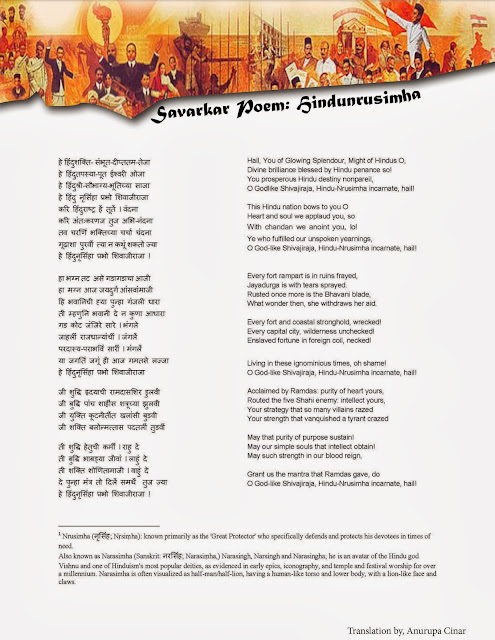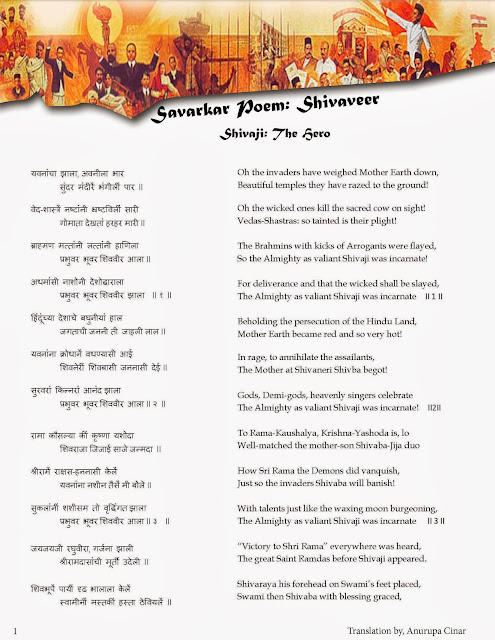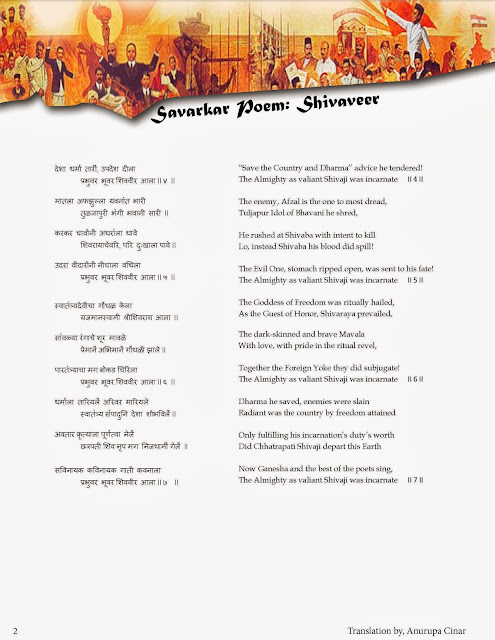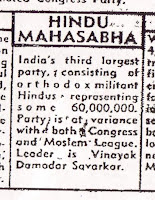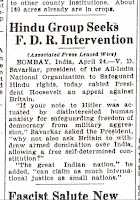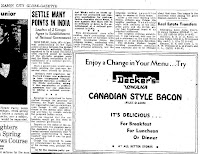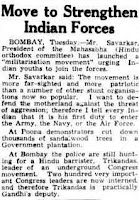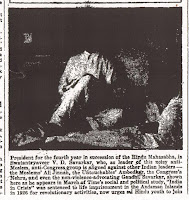
Hi, Everyone! Anyone who has read Savarkar’s biography, even in a cursory manner, is conscious of the immense admiration and respect Savarkar had for Shivaji—from the earliest childhood. Savarkar’s chapter on Shivaji in his book Hindu Padpadshahi (find an e-book @ www.savarkarsmarak.com) gives a very good idea of this too. Time and again Savarkar has hailed Shivaji as the heroic king who wrested back large portions of India from the Mughals and actively chased a “Hindavi Swaraj.”
It seems utterly preposterous and ridiculous to me that anyone should point accusing fingers at Savarkar saying he disrespected Shivaji. It is inconceivable!
Yet we live in an imperfect world—when mud is slung at anyone it tends to stick, particularly when it is accompanied by a sensationalized, wanton act of vandalism like burning copies of (Savarkar’s) books. And so, much though it goes against the grain to give even an appearance of credibility to such fallacy by mentioning it or offering vindication for Savarkar, I have decided to do it.
Here are some examples which illuminate just what place Shivaji held in Savarkar’s heart and soul.
- In 1902, Savarkar composed an aarti, a song of worship, in honor of Shivaji. Every Friday as a part of the Ferguson club activity, this aarti was sung before a picture of Shivaji.
- In 1903, Savarkar composed the poem Shivaveer (Shivaji: the Hero) in honor of Shivaji.
- He has also composed another poem, Hindunrusimha, praising Shivaji.
(I have given all the three poems at the end of this post.)
- The very first function organized by Savarkar’s Mitra Mela was a celebration of Shivaji Jayanti (birth anniversary.) This is a practice he continued to follow down the road.
- In 1905, his group popularized his ballads on Sinhagad and Baji Prabhu. Both ballads extolled the heroics of Shivaji with Tanaji and Baji Prabhu. Using these incidents of guerilla warfare, Savarkar subtlely promoted the idea of freedom. The people in Maharashtra just loved the ballads.
- Sometime after this a Shivaji festival was celebrated at Raigad. These ballads were sung there. The audience was enthralled by them, but Daji Khare, who was presiding over the event, became nervous by their inflammatory words. So fiery were the words that when the audience joined in the singing, Khare, a friend of Tilak, told him to close the show down as he did not want to be party to any unconstitutional activity!
- Babarao published this ballads in 1906 and three years later the Government proscribed them.
Unfortunately, I have not translated these ballads yet.
- In the women’s organization, parallel to Savarkar’s Mitra Mela, each member was required to take this pledge: “In the name of the Motherland, Shivaji Raja who won freedom through war, and Bhavani Mata who gives strength, I hereby give witness before Shivaji and Bhavani Durga Devi that I shall use swadeshi goods only, love my country more than my life, strive for my country’s freedom and help those who are doing so.”
- In 1906, in the patriotic song, Priyakar Hindustan (O Beloved Hindustan,) which Savarkar specially composed for the occasion commemorating the death anniversary of Guru Govind Singh, organized in a grand manner at Caxton Hall, London on December 29, 1908, he most certainly included Shivaji as one of the virtues of Hindustan.
जिजा जन्म दे शिवा जिच्यास्तव गुरु पुत्रांचे प्राण
जिच्यास्तवचि त्या कुमारिकांसी विस्तवांत ये न्हाण
Here too was born of Jijabai, Chatrapati Shivaji,
And maidens who embraced the pyre for their honor.
Bricked to death here were the Sons of the Guru,
So staunch were they in their loyal fervor!
- Again in 1908, when he composed another patriotic song, Hind Sundara Ti (Hind, the Beautiful One,) he makes a mention of Shivaji.
प्रतापशिवबंदा I श्रीगुरूगोविंदा
संभवदेउद्भवदेI देजीउत्स्फुर्ती II ७II
To Rana Pratap, Shivaji, Banda Bairagi, lo
And Guru Gobind Singhji too
She gave birth, beginning, n’ inspiration so!
- Savarkar followed Shivaji’s precept of manipulating a powerful enemy any which way, especially from a position of great weakness. He also advocated others to do so too. To give an example, he quoted instances from life of Shivaji to convince the political prisoners in Andman who had received amnesty to sign the pledges. I am giving here the incident as I have written it in my novel Burning for Freedom:
“Soon enough, general amnesty was granted to several of them here but not unconditionally. They had to sign a pledge refraining from any political activity for a specified time. This offended most of them. It was an infringement upon their rights! A slur upon their patriotism! Sign a pledge? Never! Savarkar was very heartened to see that despite all their sufferings, they were still such staunch patriots. Such Sons of India should definitely be free to fight for their country!
‘Brothers, there is nothing wrong in signing this pledge. Sign it and be free—free to work for the freedom of our motherland.’
‘Tatyarao, with the signing of this pledge our hands are tied! It forbids us to do just that very thing.’
‘Ah, but do you have to follow its dictate?’ asked Savarkar passionately. ‘No! A pledge imposed upon us by a foreign enemy power is worth only the paper it is written on. There is no reason to stay committed to it! It is merely a means to an end—only an avenue to break the locks of this jail.’
‘But that would be deceitful, Tatyarao!’
‘Deceitful to whom?’ exclaimed Savarkar. ‘When we have no constitutional rights and are crushed into subjugation by arbitrary laws of an enemy power, honesty as you mean it is not a luxury we can indulge in!’—he raised the palms of his hands—’the only honesty and truth for us is reinstating the honor of our beloved Hindustan. We follow any path that circumstances force us to take. If the British rule us by unlawful means, we go against this law of theirs to gain freedom. When under duress we make petitions and even sign pledges!’
‘Yes, Tatyarao, there is much in what you say. But it still seems cowardly to sign such papers. The blood of heroes like Shivaji flows in our veins! What, shall we supplicate before the enemy? History will label us as cowards and hypocrites!’
‘We cannot swerve from our path by fear of adverse public opinion! Shivaji was very brave indeed. Yet when needed, he took a conciliatory position with Aurangzeb. At one time, Shivaji suffered many losses from the mighty Mughal forces led by Mirza Raja Jaisingh and Dilerkhan. He made a small capitulation and signed the Treaty of Purandar. He was forced to hand over to Aurangzeb many forts and go to Agra. Here he was treacherously imprisoned by Aurangzeb. Shivaji sent petition after petition professing loyalty to him, all the while planning his escape! It was his strategic move to lull the enemy. Can Shivaji be accused of cowardice? Change of heart? Never! We must also admire the forethought with which he killed the mighty Afzal Khan by ripping open his stomach with the tiger claws. If he had not broken his promise of being unarmed in that meeting, Afzal Khan’s plot to crush him to death would have been successful!’
‘Tatyarao, indeed, we did not see it in this light.’”
- Time and again Savarkar had said India needs a Shivaji. Keer writes in his biography of Savarkar that in 1952, in one of his lectures he said that “if God were to ask him to beg for a boon, he would pray him to bless India with a Chandragupta or a Shivaji to wipe out the despondency prevailing in the minds of the younger generation and make the nation valorous and great. He said he preferred a rule of a benevolent great leader like Shivaji to an ignorant, weak-kneed democracy.”
- In 1953, when addressing a big meeting at the Jackson Garden in Nasik, he declared that the name of the garden should be changed to Shivaji Garden. He also stated that Indian Statesmen should follow the tactics and policy of Shivaji, who was a real statesman.
After reading this (and the poems below) there should be no doubt in anyone’s mind in just how high an esteem Savarkar held Shivaji.
- Anurupa
Hindunrusimha
Click here for PDF
Shivaveer
Click here for PDF
Aarti on Shivaji composed by Savarkar
जयदेव, जयदेव, जयजयशिवराया
या, याअनन्यशरणां, आर्याताराया
आर्यांच्यादेशावरीम्लेच्छांचाघाला
आलाआलासावधहोशिवभूपाला
सद्गदीताभूमातादेतुजहाकेला
करूणारवभेदूनीतवहृदयनकागेला
जयदेव, जयदेव, जयजयशिवराया
श्रीजगदंबाजीस्तवशुंभादीकभक्षी
दशमुखमर्दुनीजीश्रीरघुवरसंरक्षी
तीपूताभूमाता, म्लेंच्छाहीछळता
तुजविणशिवरायातिजकोणदुजात्राता
जयदेव, जयदेव, जयजयशिवराया
त्रस्तआम्हीदीनआम्ही, शरणतुलाआलो
परवशतेच्यापाशीमरणोन्मुखझालो
साधुपरित्राणाया, दुष्कृतीनाशाया
भगवन्भगवद्गीतासार्थकरायाया

